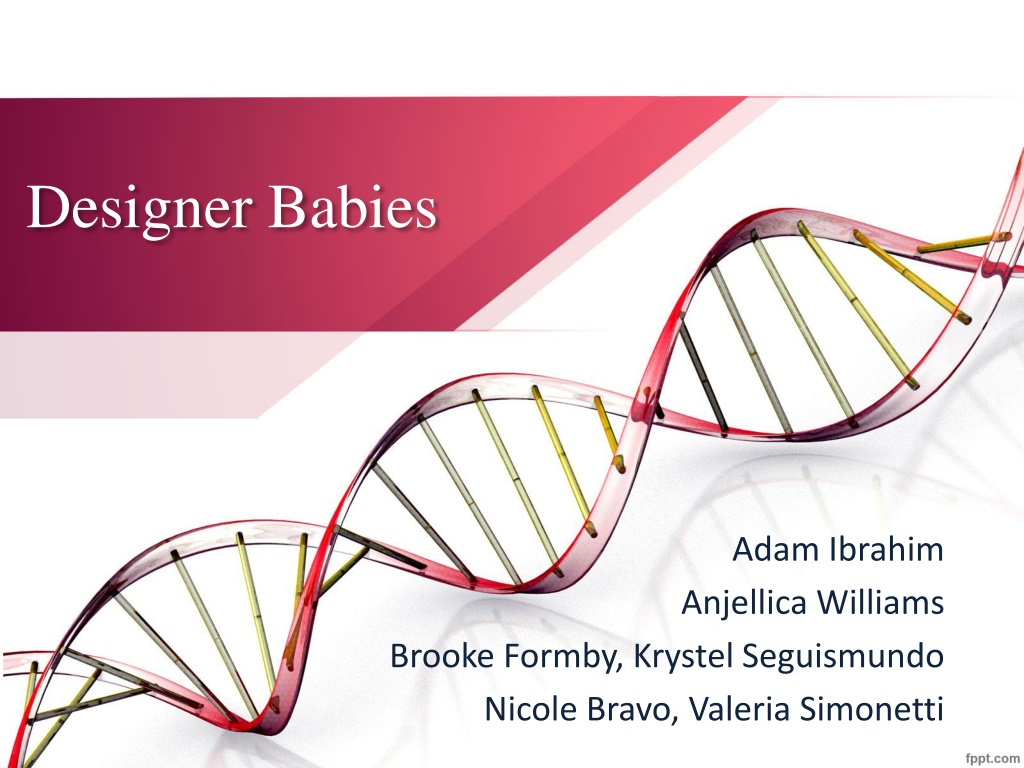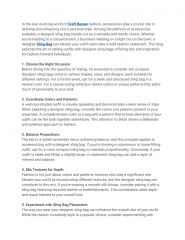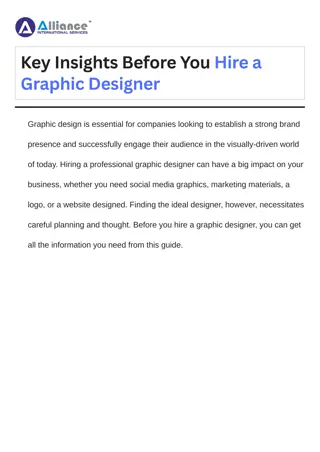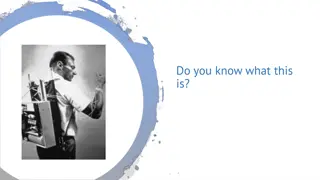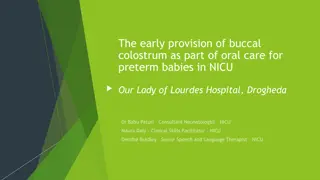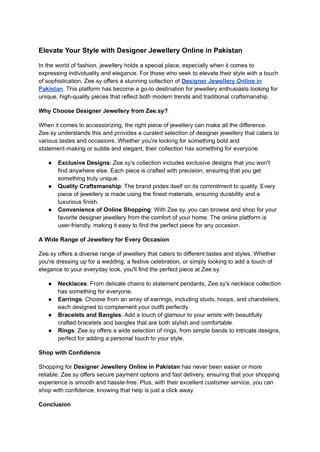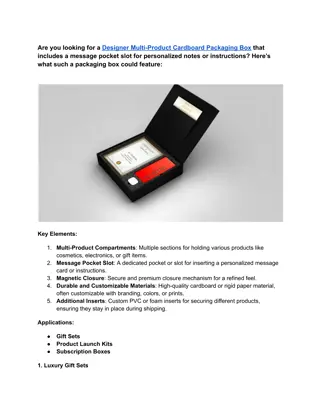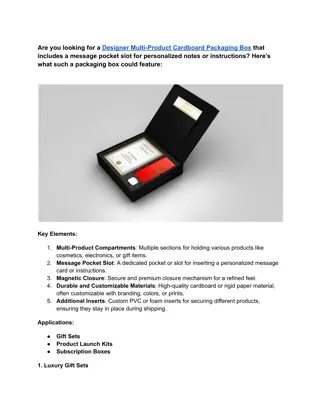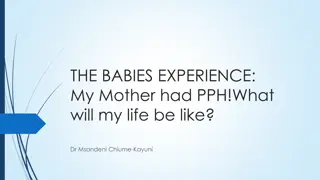Designer Babies
This content provides insights into the ethical considerations surrounding designer babies, exploring key questions, stakeholders, options, and potential impacts on traits like gender, appearance, and intelligence. It delves into genetic engineering methods, pros, and cons of modifying babies, emphasizing the need for a societal consensus before clinical use of germline editing. The content also highlights the importance of ethical reflection and decision-making processes in this controversial field.
Download Presentation

Please find below an Image/Link to download the presentation.
The content on the website is provided AS IS for your information and personal use only. It may not be sold, licensed, or shared on other websites without obtaining consent from the author.If you encounter any issues during the download, it is possible that the publisher has removed the file from their server.
You are allowed to download the files provided on this website for personal or commercial use, subject to the condition that they are used lawfully. All files are the property of their respective owners.
The content on the website is provided AS IS for your information and personal use only. It may not be sold, licensed, or shared on other websites without obtaining consent from the author.
E N D
Presentation Transcript
Designer Babies Adam Ibrahim Anjellica Williams Brooke Formby, Krystel Seguismundo Nicole Bravo, Valeria Simonetti
Seven Steps in Ethical Decision Making 1)What is the ethical dilemma? 2)What are the facts? 3)Who are the stakeholders? 4)What are the options? 5)What should I do? 6)Is it justified? 7)How could this ethical problem have been prevented?
Step #1: What is the ethical question?
What traits could be changed in a designer baby? Gender Appearance Disease Personality Intelligence
How is genetic engineering possible? In-vitro fertilization Three-parent baby CRISPR
It would be irresponsible to proceed with any clinical use of germline editing unless and until (i) the relevant safety and efficacy issues have been resolved and (ii) there is broad societal consensus about the appropriateness of the proposed application.
Step #2: What are the facts?
Pros of Genetically Modified Babies Eliminate illness and disease in unborn child: Scientists remove bad genes by germline Example of diseases that would be eradicated: 1. Cystic fibrosis 2. Huntington s disease 3. Tay-Sachs disease
Pros of Genetically Modified Babies Longer life span: Future generations will have a better quality of life Advancements in genetic engineering: Reverse basic causes of body s natural decline Adaptation Guarantee survival of the human race Medical advancements
Cons of Designer Babies Genetic Diversity Identical genomes, the population as a whole will be susceptible to virus or disease. Over Population Not enough resources on earth New Diseases Rising It may fix one disease or mutation and cause other diseases or mutations that could make the person sicker or even kill them
Cons of Designer Babies Safety Issues Unknown Consequences of Viral Genes in the Human Body God The belief that god should have ultimate power and we should not be altering nature Price Only the rich can offered it Lack of Regulations No current laws or guidelines
Step #3: What is the perspective of the stakeholders?
Primary Stakeholders The Family Parents have the intention of preventing the passing of genetic diseases to future generations Existing children may benefit Physicians and other healthcare professionals Duty of nonmaleficence Government Regulation of laws
Secondary Stakeholders Society Social changes Unpredictable long-term effects Conservative and/or religious groups HIM Professionals Interest in the safety and security of the sensitive information
Step #4: What are the options in the case?
Alternatives for Designer Babies Choosing a mate/partner. Sperm donor. Mother nature takes its course.
More Information on Genetic Engineering Other nations outlook on GE. Center for Genetics and Society: geneticsandsociety.org
Step #5: What should I do?
Worldwide Views Human embryo modification is banned/ discouraged in over 40 nations, excluding the United States. China is criticized as the Wild West of genetic research. United Kingdom s bill allows regulated scientific research in human genetic modification. Three parent babies still discussed as an ethics issue.
What should I do? Weigh the unknown long term consequences compared to the common alternatives. Consider the economic separation (affordability). How s the child life will be impacted? We re effectively creating our own evolution course.
What should I do? Are we prepared for this break-though as a community, nation, and worldwide? Just because we re capable of doing something, should we do so?
Step #6: What justifies your choice?
Is it justified? Subjective per family HGM will be passed down for generations
Step #7: How could this ethical situation have been prevented?
References http://www.conserve-energy-future.com/pros-and-cons-of-genetic-engineering.php http://nlcatp.org/5-key-pros-and-cons-of-human-genetic-engineering/ http://occupytheory.org/advantages-and-disadvantages-of-genetic-engineering/ http://nyln.org/genetic-engineering-in-humans-pros-and-cons-list http://staunton.k12.va.us/cms/lib03/VA01000591/Centricity/Domain/287/Genetic%20Engineering%20 Pros%20and%20Cons%20Research%20paper%20PDF.pdf https://www.newscientist.com/article/mg22630194-200-human-gene-editing-has-arrived-heres-why-it- matters/ http://www.telegraph.co.uk/news/science/11558305/China-shocks-world-by-genetically-engineering- human-embryos.html http://www.techinsider.io/what-countries-allow-researchers-to-edit-human-embryos-2015-10 http://www.cnn.com/2016/02/01/health/genetically-modified-embryos-dna-uk-scientists/ http://www.nature.com/news/don-t-edit-the-human-germ-line-1.17111#/b4 https://www.technologyreview.com/s/535661/engineering-the-perfect-baby/ https://www.technologyreview.com/s/524451/genome-surgery/ https://embryo.asu.edu/pages/ethics-designer-babies https://en.wikipedia.org/wiki/Mitochondrial_donation http://library.cqpress.com/cqresearcher/document.php?id=cqresrre2015061900
